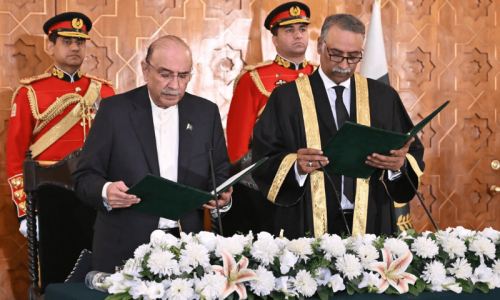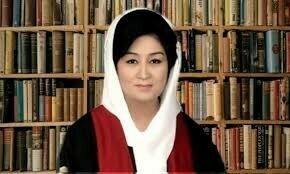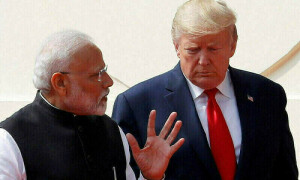ISLAMABAD: The Pakistan Army Amendment Bill sailed through the Senate on Wednesday, but voting on the 28th Constitution Amendment Bill had to be put off for six days as the government failed to ensure presence of sufficient members for the exercise requiring a two-thirds majority.
Both bills have already passed by the National Assembly and the expected adoption of the 28th amendment bill by the Senate on March 28 will pave the way for the revival of military courts to try civilians in terrorism cases.
The 28th amendment is required to give constitutional cover to the functioning of military courts.
The bill to amend the Pakistan Army Act 1952, moved by Law Minister Zahid Hamid, was opposed by three political parties — the Jamiat Ulema-i-Islami (JUI-F), the Pakhtunkhwa Milli Awami Party (PkMAP) and the Balochistan National Party-Mengal (BNP-M). Two amendments proposed by the JUI-F were rejected by the house.
Senate Chairman Mian Raza Rabbani, who is known as an exponent of supremacy of parliament and has a stated position against the military courts, presided over the session at the time of voting on the Pakistan Army Amendment Bill, but announced that he would not be available on March 28 when the house will meet again for voting on the 28th amendment.
Speaking on the army amendment bill, the law minister recalled that a similar kind of bill had been passed by the two houses of parliament in 2015 to act against those using the name of Islam for terrorism, but the term of military courts ended in January due to a sunset clause.
He said the law and order situation had considerably improved, but the country was still facing an extraordinary situation. He referred to the efforts made by Finance Minister Ishaq Dar for the fresh legislation and said four amendments had been included in the 2015 bill.
Army amendment bill sails through Senate
Maulana Attaur Rehman of the JUI-F, while opposing the army bill, said it was against the country’s interest. He said several parties had voted in favour of the 2015 bill under compulsion.
“If those teaching and studying in seminaries are terrorists then those teaching and studying in schools and colleges should also be called terrorists if they indulge in terrorist activities,” he said, adding that religion had been made a target in the bill.
The Maulana said that when the then Soviet Union came to the region, invitations of jihad were given and training imparted by the country’s institutions to the people who were later sent to a neighbouring country. Now those who had undergone training became terrorists but their trainers enjoyed an unblemished status, he regretted.
He said that those using the name of Islam for terrorism were the biggest terrorists and religious leaders and Ulema had never supported their acts. He, however, regretted that the name of religion had been used in both the National Action Plan and the army amendment bill.
The JUI-F leader warned that the country would lead to anarchy if permission was given to close religious seminaries and target Ulema and said parliament would be equally responsible along with other institutions.
Jehanzeb Jamaldini of the BNP-M said there was a need to strengthen democratic institutions. “Will we have to rely on the army throughout our lives?” he asked and said his party would not become part of this process. He said the real powers should lie with democratic institutions.
Usman Khan Kakar of the PkMAP was of the opinion that military courts were not a solution, adding that a compromise was being made for the sake of privileges, which was against the national interest. He said the scourge of terrorism could be tackled only by shunning the policy of good and bad terrorists. He referred to the Panama episode and said that if a proposal to empower the military courts to bring back wealth from abroad was made, it would not be acceptable to many political parties.
28th amendment bill
After the passage of the army amendment bill, the Senate started discussion on the 28th Constitution Amendment Bill.
Senator Farhatullah Babar of the Pakistan Peoples Party described as flawed the condition imposed on lawmakers either to follow the directions of party heads concerning a constitutional amendment or face disqualification. “It means around a dozen individuals have been given the powers to amend the Constitution. It is a dangerous concentration of power in the hands of party leaders,” he remarked.
Published in Dawn, March 23rd, 2017


















































Dear visitor, the comments section is undergoing an overhaul and will return soon.